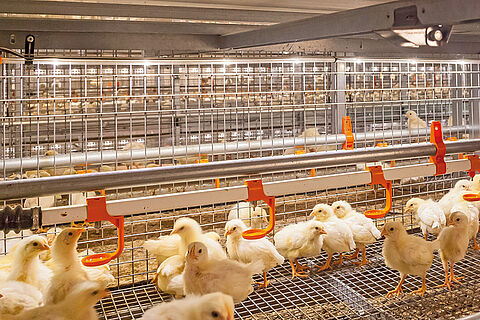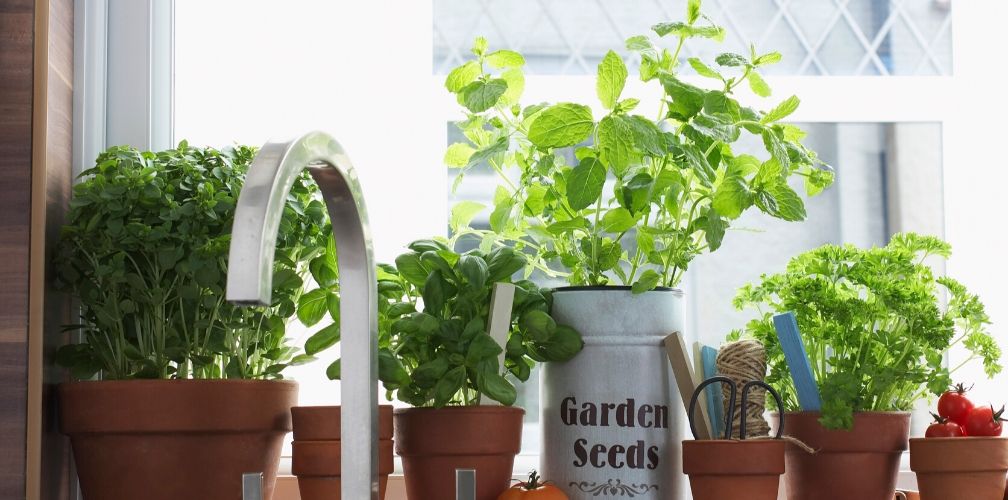Are your young chicks dying in large numbers? In out latest post on poultry farming in Kenya , we will answer your major question on taking care of young chicks on your farm. You will get causes of why some chicks are dying and give you best tips on how to prevent it immediately. The solutions will also prepare you for the next brood to see you lose almost none.
Losing baby chicks is identified as the worst challenge facing the poultry farmers in Kenya and Uganda. While it can be frustrating for beginners in the chicken keeping, the good news is that, It’s a preventable risk, in a cheap way.
In this post, you will learn how the top reasons that baby chicks to die. Secondly, the post gives you best tips you can prevent your chicks from dying.
Why are your chicks all dying.
There are many reasons why your chicks are dying one by one such as dehydration, poor feeding or exposure to cold. By understanding why your chicks falling sick, stressed or dying, you can control them to reduce and/or eliminate losses as a poultry farmer. The full list of reasons why your baby chicks are dying are;
- Exposure to very cold (or high) temperatures
- Illness from chicken pests and diseases
- Low quality feeding
- Dehydration; low access to clean water supply
- Over crowding; Improper housing leading to overcrowding, poor ventilation and elevation.
- Poor hygiene
How can you avoid chicken losses? The best methods to cope with chicken losses are to copy nature. You can imitate how the wild birds and fowls hatch, care and nurture their chicks to maturity. The following are suggestions you can consider to avoid losing chicks in large numbers. They are discussed in detail as follows
Which are the signs my baby chicks is dying
As you will learn in this post, Its possible to prevent your baby chicks from dying. The best way is to diagnose your chicks are unwell and reviving or preventing it.
The following are key symptoms that your baby chick is dying.
- Visible injuries or swellings: A bird injury can occur during shipping, the chick could have fallen off something or perhaps someone dropped the chick? An internal injury can occur from such a fall.
- Chicks diarrhea: There are many reasons why this may happen. Your chicks can be too hot. The brooder may be unclean. On the other hand, a dry diarrhea could be a symptom of coccidiosis.
- Loud chirping: Are your chicks chirping so loud at night? May be the brood temperatures are dropping too much at night. During the day? It is getting too hot or cold (winter/cold season). Other reasons could be poor feeding, dehydration or sickness as well as other discomforts.
- Isolation: are there some chicks that are getting picked on and can not get enough food or water? It may be a sign of a larger challenge. You can consider quarantining the weak chicks until they are stronger and healthy.
Keep them warm
Your baby chicks develop adult feathers in 8 weeks. Generally, their brooding hen can keep them warm. However, as a commercial farmer with many chicks, you must provide them with an alternative heat source.
| Chick’s age | Brood Temperature |
| 1st Week | 92 – 95°F |
| 2-3 Weeks | 85 – 90°F |
| 3-5 Weeks | 80 – 85°F |
| 5-8 Weeks | 70 – 80°F |
| 8 Weeks + | Room temperature |
The above chart has the recommended baby chicks temperature. Most successful chicken farmers opt to use a chicken heat lamps. But, the electricity expenses for heat lamps are high and can cause fire. Other alternatives to heat lamps are Heated chick pads, Reptile heat lamps, Chicken coop heaters and the Chicken brooder heat plates.
Incase of poor access to on-grid electricity or supply interruptions, you can keep your baby chicks warm without electricity using cold brooders, hot water bottles and kerosene lamps.
Vaccinate them against diseases and Infections
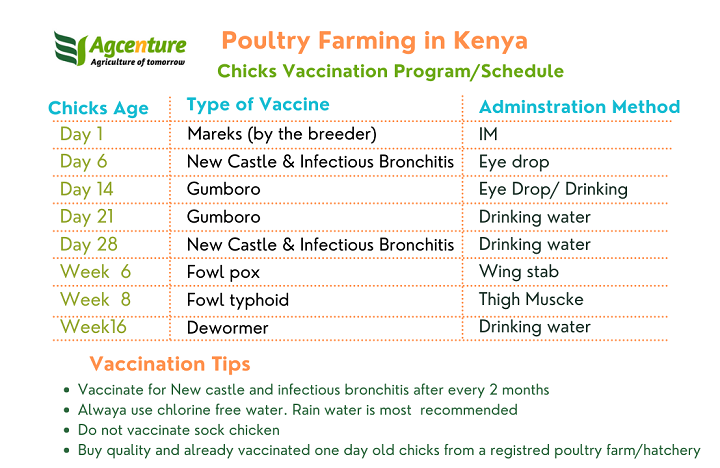
Chicken diseases like the Newcastle Disease can easily wipe your chicken population . While the improved indigenous (kienyeji) chicken varieties have a natural immune, hybrid layers and exotic broilers are more susceptible. To reduce your losses, follow a chicken vaccination schedule from day one as shown above.
The common chicken diseases in the region are Marek, Newcastle and infectious bronchitis. Others are Gumboro, fowl pox and fowl typhoid. Besides, you will need to deworm your chicken.
Pests Control
Pests infestations can make your baby chicks sick and kill them at time. Common chicken pests are worms, lice and red mites. Below are how to control them.
- Chicken lice
- Chicken lice give them white marks under their chicken wings, breasts, feathers and around the vent. Other signs are feather loss, pale wattles restlessness and anemia. You can control chicken lice by applying lice powder, provide dust baths and keep the coop clean by applying diatomaceous earth, mite spray and garlic juices.
- Red mites
- Red mites feed on your chicks at night. It causes them skin irritation, stress and anaemia. During the day they hide in cracks. They range in colour from a very light grey, almost translucent to a light brown, black and blood-red colour after a feed.
To control poultry mites by applying paint paraffin in cracks and crevices, use pressure washers to wash out mites and provide dust baths to get rid of mites and lice in a natural way. Other control methods are using diatom, poultry shield and other organic pest control products like peppermint and neem oil.
Provide quality feed
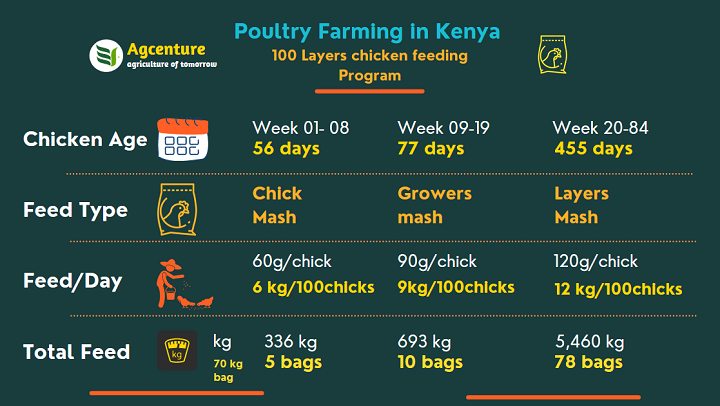
Another cause your baby chicks are dying can be hunger or poor feeding. You are either feeding them less than the daily chick feed required per day, or giving them low-quality chick mash from a counterfeit feed supplier.
The figure above is a layers chicken feeding program. It shows you the recommended feeding rate for each chicken per day. You can see a broilers chicken feeding program here
Commercial chicken feeds can be costly. You can make some at home using corn, supplements or sunflower seeds etc. Besides, you can rear them using the free-range method. You will release them to scavenge on the compound and provide them feed from time to time.
Give then clean water
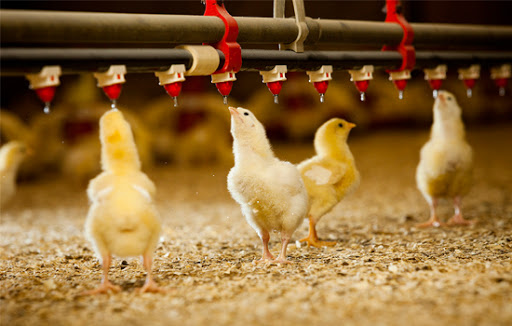
You may be losing your baby chicks is poor access quality or clean water. Without water, they will dehydrate and die. If the waterers are not raised up, they will poop into it or kick beddings and food into it contaminating it.
How can you ensure baby chicks has access to clean water? There are two best methods for properly watering your chicks.
- Ground waterers. Put water in a bowl and leave it to chicks. Because chicks may drown in it, buy some clean pebbles that are used in terrariums. Besides the watering bowls, you can buy baby chick waters with a heavy base made of glass or plastic.
- Hanging water bottles. You can use normal bottles and cover them with brooder bottle caps. These nipple outlets allow water to drip out. They are cheap, easy to fit and besides, they keep the water clean.
Provide proper Housing
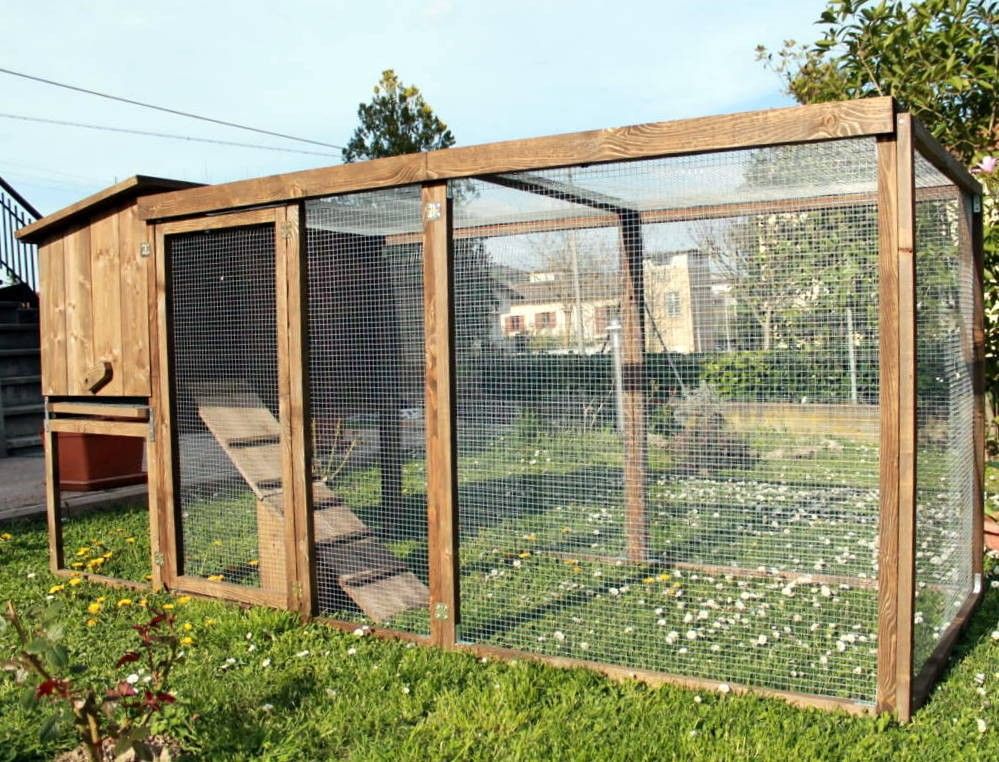
Your chicken house can reduce or cause you losses. A proper chick cage will provide safety from weather elements like rain and extreme temperature. A good house will provide security from thieves and pests like stray pets that may attack your chicken.
While considering the best type of chicken housing, there are two major factors to check into spacing, ventilation and elevation.
- Reduce Congestion
- Your chicken house must be spacious enough. The larger is better that you chicken are never congested. In warmer areas, and as your chicks mature, allow them more space. Give a minimum of 2-3 square foot per bird inside the coop. Congested birds will suffer from overheating, cannibalism, stress and infections.
- Give ample Ventilation
- Chicken loves good ventilation. It keeps the houses cool and the flesh flow of air keeps the air clean. Every 10 square feet of chicken coop floor space requires 1 square foot of ventilation. For large commercial chicken houses, you can install box fans and coolers to ensure good ventilation and air circulation
- Consider good Elevation
- Good chicken coops are raised at least one foot off the ground. A raised house allows for air circulation and prevent flooding if you are in a flood prone region. The final benefit of a raised chicken house is keeping burrowing pests like rats and mice from nesting.
Observe hygiene & biosecurity Measures
Finally poor hygiene is another challenge for chicken farmer. When left unclean, the chick poop may transmit bacteria and virus causing your chicken illnesses. The decomposing material may produce poisonous ammonia gas that can inflame the fragile baby chicks’ lungs.
Make sure you clean water dishes, waterers and bottle nipples daily using warm water and an approved poultry sanitizer. Observe the same for feeders. The brooder should be cleaned often to remove soiled and damp beddings in the chicken house.
Conclusion on how to avoid losing your chicks
In conclusion, you can reduce most losses by following the suggestions in this article. Another effective risk transfer method is applying for chicken insurance. If one is not available, look for livestock and pet insurance policies that may cover losses. The received compensation can help you to bounce back much faster than using your own savings
Do you have additional tips for raising happy and healthy chicken? Let us know in the comments below.
